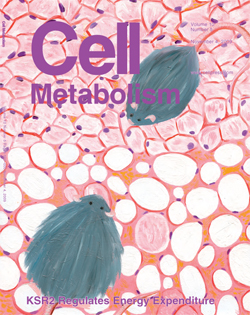 A UNMC research study could provide new clues on cell metabolism including how energy is regulated and used.
A UNMC research study could provide new clues on cell metabolism including how energy is regulated and used.
The findings, published in the latest issue of Cell Metabolism, show that mice are obese and insulin resistant when they lack a gene that interacts with, and controls, enzymes that regulate a cell’s energy level.
“What is interesting and different about this mouse is that it eats significantly less than its normal brothers and sisters and is more active, but is fat,” said Eppley Institute professor Rob Lewis, Ph.D. “It’s not unlike the person who diets, but has trouble losing weight.”
The genetically modified mouse model developed in Dr. Lewis’s laboratory lacks a protein called Kinase Suppressor of Ras 2 (KSR2). The study shows that, in mice, KSR2 interacts with and controls the activity of AMPK, an enzyme that promotes energy generation and prevents energy storage. When KSR2 is disrupted, AMPK function is impaired, which Dr. Lewis believes contributes to the obesity of the adult mice.
 |
Nicole Nelson, a summer student with Eppley Institute’s Ming Tsai, Ph.D., painted a depiction of the mice and a cross section of their fat cells for the cover of Cell Metabolism. Nelson is an art and biology major at the University of Nebraska at Omaha. |
“The insulin resistance appears to be secondary to obesity and similar to what physicians observe in some obese humans.”
There is no data to suggest that KSR2 affects insulin resistance in humans, he said, although a commonly prescribed drug for treating diabetes is thought to indirectly activate AMPK to promote glucose uptake.
Dr. Lewis will continue to explore the essential contribution of KSR proteins to metabolism in obesity, insulin action and cancer.
“We know that cancer cells commonly change the way they metabolize glucose,” he said. “Recent studies have shown that this shift in metabolism is critical to tumor development and survival. Our preliminary studies suggest that KSR2 and a related gene, KSR1, play a critical role in determining how some tumor cells metabolize glucose. If we better understand the metabolism of cancer cells we may be able to produce new therapeutics.”
The article’s 26 authors hail from:
- UNMC;
- The University of Cincinnati;
- The National Institutes of Health;
- Pfizer Global Research and Development;
- Penn State University;
- The U.S. Army Research Institute Environmental Medicine;
- Seahorse Bioscience; and
- Washington University.
I’m proud of the diverse set of collaborators that helped us study the biochemistry and physiology of KSR2. We could not have completed the project without their expertise and dedicated effort.